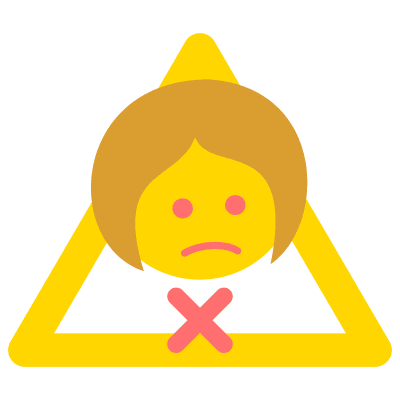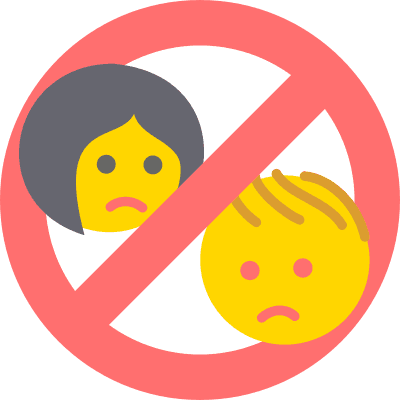Can You Sue a Babysitter? (What the Law Says)


Written & Illustrated by
Matthew James Taylor
Kidsit Founder, General Manager
You occasionally hear awful stories in the news about child neglect and abuse at the hands of babysitters. What legal recourse would you have if it happened to you?
Can you sue a babysitter? You can pursue legal action against a babysitter if you feel they've harmed you or your child through negligence or willful malice. Your ability to successfully win a case against a babysitter will depend on the severity of the issue, their age, and how much evidence you have.
Kidsit babysitting statistics
Only 8.37% of babysitters have liability insurance.
(Babysitting statistics calculated weekly from our live member data — Updated 16 Feb 2026)
Why Might You Sue A Babysitter?
When you hire a babysitter, you're putting them in charge of two of the most important things in your life: your children and your home. That's a lot of responsibility and not something that should be taken lightly.
Because of their curious nature, children need constant supervision to make sure they stay safe. Leaving a young child unattended puts them at serious risk of accidental injury or even death.
A big part of your babysitter's responsibilities is making sure they're supervised at all times so that can't happen.
If your child is injured severely enough under their watch, you might consider suing the babysitter for negligent supervision. Especially cases where permanent damage is done.
The same is true if your babysitter causes serious damage to your home, or knowingly allows damage to happen.
What Is Needed To Win A Lawsuit Against A Babysitter?
If you can prove that a babysitter intentionally harmed your child or home, suing them should be pretty straightforward.
Things are a bit more difficult if the babysitter caused damage or harm unintentionally. To successfully win a lawsuit against a negligent babysitter, you'll need to prove a duty of care, a breach of their duty, and causation.
What Is Duty of Care?
You need to show that the babysitter owed a duty of care to your child.
A duty of care is a legal obligation to take reasonable precautions to prevent harm to your child. Babysitters also have some duty of care toward your home and other personal property.
To establish a duty of care, you need to be able to prove that your babysitter accepted the responsibility of supervising your child.
In the case of a babysitter, a duty of care can most likely be presumed without them explicitly accepting the responsibility. But it's best to have some kind of written contract with your babysitter in advance just to be sure.
What Is A Breach Of The Duty of Care?
You will need to show that your babysitter breached their duty of care by not providing proper supervision. In other words, proving they were negligent.
This gets a bit tricky when determining what is considered reasonable or adequate supervision.
For example, if your child hits their head on the coffee table, it may be difficult to prove the babysitter was negligent. Children often run around and bumping their heads on objects in their environment is nearly an everyday occurrence.
However, if your babysitter allows your child to fall down the stairs and breaks an arm, there is a better argument for negligence. They should have been supervising your child to keep them away from the stairs, and not allowed them to use the stairs alone.
Just the fact that your child was injured under a babysitter's supervision doesn't necessarily mean they were negligent.
Look out for bad babysitter warning signs and take action early if you suspect anything.
You may also consider installing a nanny cam for added peace of mind. If so, make sure to read this article first: Is it legal to record a babysitter to learn what you can and can't do in your area.
What is Causation?
The last thing that will be needed is to link the babysitter's breach in their duty of care (negligence) with injuries to your child or damage to your property.
Your babysitter can't be found negligent if there isn't a direct connection between a lack of supervision and your child's injuries, or if the child's injuries weren't reasonably foreseeable.
For example, if your babysitter was supervising your child while they played in your backyard in the middle of New York City and your child was attacked by a mountain lion, that's not something they could have reasonably foreseen.
But if you live in a remote area of Alaska and your child is attacked by a bear outside under your babysitters watch, there's a much better argument that they should have reasonably foreseen it and taken proper precautions.
For an example involving property, consider the following two scenarios:
- Your babysitter is cooking a meal and leaves the stove unattended and causes a fire in your home.
- A faulty lamp catches fire in another room in the house and your babysitter doesn't notice until the fire is out of control.
The first case is likely to be considered negligence, but the second is not. That's because the second fire wasn't a result of their direct actions, and they couldn't have reasonably known about it. Even if part of their job is to monitor your house.
Other Factors
A judge or jury will also consider other factors when deciding a case against your babysitter. For example, age can play a big factor. The older a babysitter is, the higher a standard of care that would be expected of them. A 13-year-old may not be able to handle or foresee some of the situations that an 18-year-old babysitter could.
Can you sue a babysitter if they're a minor? (Under 18 years old)
It's much more difficult to sue a minor, but not impossible.
Breach of contract cases are especially difficult to win against a minor. For example, if your babysitter canceled last-minute and you incurred extra costs or inconvenience because of it, it would be hard to win such a court case against a minor.
That's because, in many places, minors are able to disavow (or back out of) contracts as long as they're under 18 years old.
It's possible to sue a minor for damaging your property, although it will rarely be worthwhile. Minors rarely have any money and wouldn't be able to pay any judgment anyway.
What About Suing The Minor's Parent?
In most jurisdictions, minors are allowed to represent themselves in small claims court, but only up to claim amounts of about $500. In cases above that, the child will need a representative, called a litigation guardian. A litigation guardian can be anyone who can sue on their own who aren't involved with the opposing people of the case. Usually, this is a parent or relative.
In most cases, parents aren't legally responsible for damages that their children cause because of negligence.
You have a significantly higher probability of winning your case if the minor is guilty of willful or malicious misconduct. In this case, parents of minors can be found liable in the majority of cases.
For example, in most US states parents may be liable for up to $10,000 of intentional property damage committed by their minor. Most provinces in Canada have a Parental Responsibility Act which holds parents financially responsible for intentional damage caused by their children. Australia and the UK have similar laws.
Related Questions
Can a babysitter sue me?
Yes, a babysitter can sue you as the parent. Your home insurance policy likely includes liability insurance to cover you for around $50,000 - $100,000. But it may be prudent to get additional umbrella liability coverage added to your plan to cover you for $1-2 million.
A babysitter may sue you for injury or perceived injury, getting sick from eating your food, having an accident while driving home, or many other reasons. So it's good to have sufficient insurance.
Do babysitters require insurance?
Most professional babysitters do get insurance in case of an accident or emergency. Teens who only babysit part-time are unlikely to have insurance, and there is no requirement for them to have it. That might be a factor in which babysitter you decide to have watch your child.
Can I sue a relative or friend who was watching my child for free?
Yes, you can still sue a babysitter even if they were doing it for you on a volunteer basis. It's still reasonable to assume a duty of care exists even if they weren't doing it for financial compensation and it couldn't be considered a job.
Next:
Can my babysitter sue me?
Disclaimer: I'm not a lawyer. These details here are presented as accurately as possible but may contain errors and are for information purposes only. In addition, laws vary significantly from country to country and even from state to state. You should consult a professional or look into your local laws before making any decisions.































